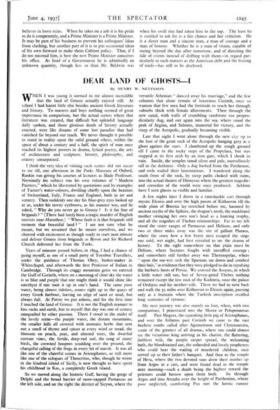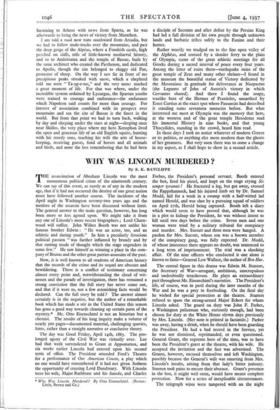DEAR LAND OF GHOSTS-4
By HENRY W. NEVINSON
I think the very idea of visiting such scenes did not occur to me tlll, one afternoon in the Parks Museum of Oxford, Ruskin was giving his courses of lectures as Slade Professor. Nominally his subject was his own volumes of " Modern Painters," which he illustrated by quotations and by examples of Turner's water-colours, dwelling chiefly upon the beauties of Switzerland, Italy, France and England, both in art and scenery. Then suddenly one day his blue-grey eyes looked up at us, under his tawny eyebrows, as his manner was, and he asked, " Why do you never go to Greece ? Is it for fear of brigands ? " (There had lately been a tragic murder of English tourists near Marathon.) " Whose fault is it that brigands still torment that beautiful land ? " I am not sure what he meant, but we assumed that he meant ourselves, and we cheered with excitement as though ready to start next minute and deliver Greece from brigands as Byron and Sir Richard Church delivered her from the Turks.
Years of minutes passed before, in 1894, I had a chance of going myself, as one of a small party of Toynbee Travellers, under the guidance of Thomas Okey, basket-maker in Whitechapel, and afterwards the first Professor of Italian in Cambridge. Through its craggy mountain gates we entered the Gulf of Corinth, where on a morning of clear sky the water is so blue and purple that one might think it would shine like amethyst if one took it up in one's hand. The same pure water, being almost tideless, comes right up to the quays of every Greek harbour, leaving no edge of sand or mud, but always full. At Patras we put ashore, and for the first time I touched the land of Greece. It is not the English manner to kiss rocks and earth, but to myself that day was one of ecstasy unequalled by other passion. There I stood in the midst of the lovely scene—the purple water, the distant mountains, the smaller hills all covered with aromatic herbs that sent out a smell of thyme and spices at every wind or tread, the blossom on peach, pear, and almond trees, the dwarfed currant vines, the fertile, deep-red soil, the song of many birds, the crowned hoopoes scudding over the ground, the changeful calling of the frogs in every bit of marsh. It was all like one of the cheerful scenes in Aristophanes, or still more like one of the eclogues of Theocritus, who„ though he wrote in the kindred island of Sicily, is now thought to have spent his childhood in Kos, a completely Greek island, So we moved along the historic Gulf, having the gorge of Delphi and the broad barrier of snow-capped. Parnassus on the left side, and on the right the district of Sicyon, where the versatile Athenian " danced away his marriage," and the few columns that alone remain of luxurious Corinth, once so wanton that few men had the fortitude to reach her through suburbs thick with female allurements. Then through the new canal, with walls of crumbling sandstone too perpen- dicularly dug, and out again into the sea, where stood the peak of Aegina, and Salamis, immortal for victory, and the steep of the Acropolis, gradually becoming visible.
Late that night I went alone through the new city up to the foot of the great rock of the Acropolis hanging grey as a ghost against the stars. I clambered up the rough ground till I came to the rocky steps of the Propylaea, but was stopped at its first arch by an iron gate, which I shook in vain. Inside, the temples stood silent and pale, marvellously tall in the darknesi; Only a dog barked from the Parthenon, and owls wailed their lamentations. I wandered along the south front of the rock, by steep paths choked with ruins, into the actual theatre of Dionysus where the greatest tragedies and comedies of the world were once produced. Seldom have I seen ghosts so visible and familiar.
A few nights later I drove in a ramshackle cart through mystic Eleusis and over the high passes of Kithaeron till the wide plain of Boeotia lay stretched before me, haunted by ancient myths of the Sphinx, the dragon's teeth, the maddened mother swinging her own son's head as a hunting trophy, and all the tragedies of Theban relationships. Far to my left stood the sister ranges of Parnassus and Helicon, and only two or three miles away was the site of gallant Plataea, where the story how a few brave men escaped the siege one cold, wet night, had first revealed to me the drama of history. To the right somewhere on that plain must be Delium, where Socrates fought with unruffled courage ; and somewhere still further away was Thermopylae, where " upon the sea-wet rock the Spartans sat down and combed their hair," as evidence that they were pledged to die in repulsing the barbaric hosts of Persia. We crossed the Asopus, in which a little water still ran, but of Seven-gated Thebes nothing remained except the low rock of the Kadmeia, once the palace of Oedipus and his mother-wife. There we had to turn back and walk the 35 miles over Kithaeron to Eleusis again, pausing only at a fountain where the Turkish inscription recalled long centuries of tyranny.
My next journey was also mainly on foot, when, with two companions, I penetrated into the Morea or Peloponnesus itself. Past Megara, the squeaking little pig of Aristophanes, and over the Isthmus past Corinth we came to the vast beehive tombs called after Agamemnon and Clytemnestra, scene of the greatest of all dramas, where one could almost see the victorious king arriving in his chariot, the flattering, faithless wife, the purple carpet spread, the welcoming bath, the bloodstained axe, the unheeded and lovely prophetess who could hear the wailing of murdered children, once served up to their father's banquet. And then to the temple of Hera, where the two devoted sons drew their mother up from Argos in a cart, and were found dead in the temple next morning—such a death being thc highest reward the priestess could bestow upon them both. So through Argos and into Arcadia over the height of Parthenion, where poor neglected, comforting Pan met the heroic runner hastening to Athens with news from Sparta, as he was afterwards to bring the news of victory from Marathon.
I am told a road now runs southward from Arcadia, but we had to follow mule-tracks over the mountains, and past the deep gorge of the Alpeus, where a Frankish castle, high perched on cliffs, tells of little-known mediaeval history, and so to Andritsaina and the temple of Bassae, built by the same architect who created the Parthenon, and dedicated to Apollo, though the site belonged to shaggy old Pan, protector of sheep. On the way I saw far in front of me precipitous peaks streaked with snow, which a shepherd told me were " Ta-yg-e-tos," and the very name marked a great moment of life. For that was where, under the incredible system ordained by Lycurgus, the Spartan youths were trained to courage and endurance—the endurance which Napoleon said counts for more than courage. For interest of association combined with its prospect over mountains and sea the site of Bassae is the finest in the world. But from that point we had to turn back, walking by day and sleeping under the stars at night—sleeping once near Skillos, the very place where my hero Xenophon lived the open and generous life of art old English squire, hunting with his sturdy sons, teaching his wife the arts of house- keeping, receiving guests, fond of horses and all animals and birds, and none the less remembering that he had been a disciple of Socrates and after defeat by the Persian King had led a full division of his own people through unknown lands and barbaric tribes safely to the Euxine and their homes.
Rather wearily we trudged on to the fine open valley of the Alpheus, and crossed by a slender ferry to the plain of Olympia, scene of the great athletic meetings for all Greeks during a sacred interval of peace every four years. Among the litter of ruins there—earthquake ruins of the great temple of Zeus and many other shrines—I found in the museum the beautiful statue of Victory dedicated by the Messenians in gratitude for deliverance at Naupactus (the Lepanto of John of Austria's victory in which Cervantes shared). And there I found the soapy, waxlike bust of the Hermes of Praxiteles, unearthed by Ernst Curtius at the exact spot where Pausanias had described it standing some seventeen centuries before. But what interested me most at Olympia was the memory that here, at the western end of the great temple Herodotus read his immortal History in nine books, and that young Thucydides, standing in the crowd, heard him read.
In those days I took no notice whatever of modern Greece or its politics, or anything else more modem than the ghosts of her greatness. But very soon there was to come a change in my aspect, as I shall hope to show in a second article.











































 Previous page
Previous page